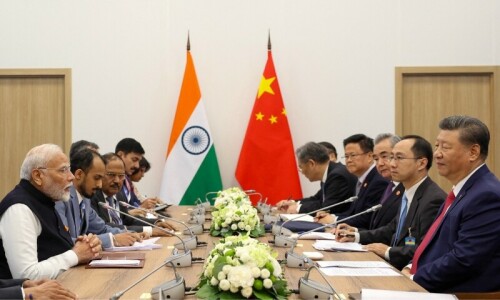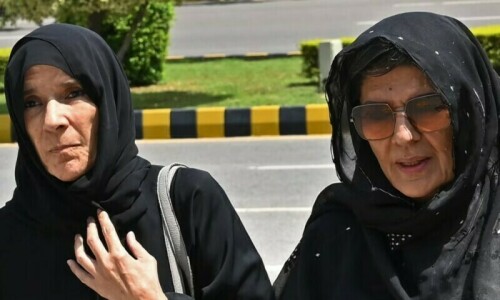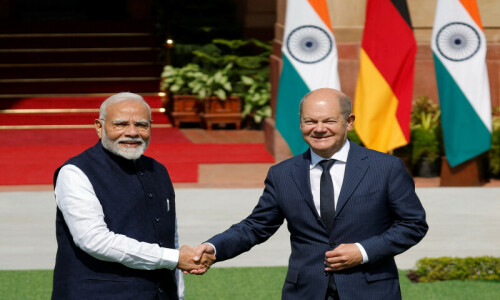• Three-pronged strategy to counter militant threat, army chief tells in-camera session
• Says engagement with terrorists ‘backfired’; assures MNAs of zero tolerance for their facilitators
• Urges politicians to shun talk of ‘old or new’, unite for sake of ‘our Pakistan’
ISLAMABAD: Chief of Army Staff Gen Syed Asim Munir acknowledged on Friday that a strategy to engage with terrorists had allowed them to regroup in the tribal areas, before the country’s political and military leadership agreed to revisit the anti-terrorism strategy, during an in-camera briefing to members of the National Assembly.
Gen Munir was apparently referring to the policy devised and followed by the military and political leadership under the PTI regime, following the Taliban takeover of Afghanistan in August 2021.
To date, former prime minister and PTI chief Imran Khan has defended his policy and still supports the idea of resettling militants returning from Afghanistan.
In a clear shift from the policy of the previous regime, Friday’s in-camera sitting was told that a three-pronged plan — deter, dialogue and development — to root out terrorism was already underway, after lawmakers expressed serious concerns over the resurgence of terrorist groups.
The agreement came after the military leadership discussed recent acts of terrorism across the country and shared details of efforts being made by security forces aimed at eliminating terrorism, maintaining internal security and defending Pakistan from external threats.
The two-hour in-camera briefing contained updates about the country’s current security issues and the army’s anti-terror operations in Balochistan, Khyber Pakhtunkhwa, Punjab, Gilgit-Baltistan and other parts of the country.
During the briefing, Gen Munir also apprised parliamentarians about plans of the banned Tehreek-i-Taliban Pakistan (TTP) and security forces’ endeavours to counter them.
The director general of Inter-Services Intelligence, Lt Gen Nadeem Anjum in his briefing apprised lawmakers about the connivance of hostile intelligence agencies with terrorist groups.
The briefing was followed by a one-and-a-half-hour long Q&A session.
Sources said the army chief stressed the need for revisiting the anti-terrorism action plan and suggested a multi-dimensional or ‘3-D’ strategy.
After the Army Public School attack on Dec 16, 2014, a national consensus was evolved leading to a 20-point National Action Plan (NAP) for countering terrorism and extremism which was approved by parliament. NAP spelled out the specifics for the counterterrorism drive in the country.
A lawmaker told Dawn the army chief dispelled the impression of waging a full-scale anti-terror operation in the tribal areas and suggested the ‘deter, dialogue and development’ plan to neutralise the terrorists.
According to the army chief, the ‘3-D’ plan is not a novel idea because it is consistent with state policy. He suggested including all stakeholders in this strategy such as security forces, legal fraternity, civil society, politicians, social workers, bureaucracy, diplomats and media.
Gen Munir claimed that security forces had cleared all ‘no-go areas’ in Pakistan and 80,000 personnel had made sacrifices for this cause.
He further said that the terrorists were left with no option than to accept the writ of state.
Gen Munir also urged politicians to leave aside their differences. According to a lawmaker, the army said that instead of working for ‘new or old Pakistan’, politicians should unite for “our Pakistan”.
Tough questions
During the Q&A, senior politicians and heads of political parties appreciated the efforts of armed forces, but the army chief also faced some tough questions, especially from those lawmakers hailing from tribal districts.
They questioned the resurgence of the TTP and the previous government’s strategy of engaging them through dialogue.
A couple of MNAs also demanded action against those who facilitated the terrorist groups, at which the military leadership responded that there would be zero tolerance for such elements, the lawmaker said.
According to sources, Prime Minister Shehbaz Sharif praised the security forces for their sacrifices.
Sources quoted PM Shehbaz as saying that the previous government had wasted the anti-terror efforts and subsequently terrorism returned to the country.
On Thursday, Ali Wazir from South Waziristan while speaking in the National Assembly had declared that they would not allow any operation in the territory without “trial and conviction of those serving and retired army generals” who had helped these terrorists resettle in these areas.
Mr Wazir, who spent most of the time behind bars reportedly due to his anti-establishment speeches and actions, recalled that he had raised the matter with Shehbaz Sharif when he was brought from Karachi to attend meetings of the then opposition parties at the time of the no-confidence resolution against former prime minister Imran Khan.
The MNA claimed that not only the people and the parliament, but GHQ was also not taken into confidence about the agreements reached with the militants in Afghanistan for their resettlement in Pakistan.
Published in Dawn, April 15th, 2023












































Dear visitor, the comments section is undergoing an overhaul and will return soon.